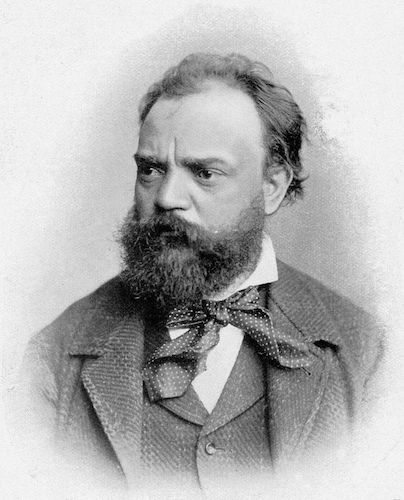Nelsons, BSO and soloists convey the spiritual solace of Dvořák’s “Stabat Mater”
In 1877, Antonin Dvořák faced a profound tragedy. Within a short period, three of his children died, and the Czech composer turned to music for consolation.
A pious and devout Catholic, the composer poured his grief into his Stabat Mater, an expansive setting of a thirteenth-century prayer that explores Mary’s sorrow over the death of Christ.
Completed in the wake of the deaths in his family, the Stabat Mater is a statement of quiet, abiding faith. And when Andris Nelsons led the Boston Symphony Orchestra, a stellar cast of soloists, and the Tanglewood Festival Chorus in the score at Symphony Hall Thursday night, it resonated with a sense of eternal hope.
The Stabat Mater remains little known in the United States, and the BSO has only performed the complete work on two occasions—once in Louisville, Kentucky in 1891, under the direction of Arthur Nikisch, and the other in Symphony Hall in 1980 under Seiji Ozawa.
Dvořák’s composition is worlds away from Rossini’s operatic setting of the same text, unfolding with a reverence and poetic grace that leave a lasting impression. Throughout its contemplative ninety minutes, listeners are called upon upon to experience all of Christ’s intense physical suffering.
Nelsons’ direction resulted in a compelling, intensely spiritual, reading. His tempos lingered where appropriate, and he drew attention to the many details that overflow in this mellifluous score. In the opening and closing movements, string and wind lines unwound from spare octaves and interlaced in a rich musical fabric. Solo English horn and oboe phrases brought fleeting bucolic touches to the inner movements, and the triumphant A major chord, which erupted from a long crescendo in the finale, seemed to shake the hall to its foundation.
Each of the evening’s soloists captured Dvořák’s mix of solace and conviction.
In her brief solo moments Rachel Willis-Sørensen (a replacement for Kristine Opolais) sang with a bright, ringing soprano that had just the right touch of vibrato to express the grief etched into this music. (Dvořák’s music is becoming a specialty for the American soprano, who makes her role debut in Rusalka with San Francisco Opera this summer.)
Mezzo-soprano Violeta Urmana brought dark resonance to “Inflammatus et accensus.” With crisp diction and wide dynamic range, she shaped her lines in flowing arcs, an unfortunate flubbed entrance apart.
Dmytro Popov’s tenor beamed in all registers, but his interpretive instincts seemed less consistent. In “Fac me vere tecum flere,” his slurred diction failed to touch teh deep emotions of Mary’s weeping. The clearly enunciated “Juxta Crucem,” though, coursed vigorously, his singing well suited to the call for believers to stand by Christ’s cross.
The star of the evening was bass Matthew Rose, a last-minute sub for an ailing Ain Anger. Singing with a deep, ringing tone, Rose rendered “Fac ut ardeat cor meum” with burning religious fervor.
In the Stabat Mater’s many ensemble sections, the soloists combined their voices for tender moments. The opening “Stabat Mater dolorosa” had a tinge of sweet agony; the final “Quando corpus morietur” was a scene of delicate repose.
The Tanglewood Festival Chorus, prepared by James Burton, sensitively charted Dvořák’s resplendent choral writing. The ensemble’s singing in “Eia, mater, fons amoris” conveyed inconsolable sadness. The “Tui nati vulnerati” suffered from a few tentative attacks, but the singers’ confidence grew as the movement progressed, the melodies weaving together in a svelte sonic blanket. “After a brisk fugal “Amen,” the chorus rang out a thundering “Quando corpus morietur” (When my body dies) before the music faded into silence. Death, the music seemed to say, is merely a doorway into a comforting eternity.
Thursday’s performance proved timely, with the passing of André Previn earlier in the day at age 89. From 1977 to 2009, Previn was a frequent guest conductor and piano soloist with the BSO and Boston Symphony Camber Players. His 90th birthday (which would have been April 6), was to be celebrated at the Tanglewood Festival this summer.
Nelsons opened the concert with “Nimrod” from Elgar’s Enigma Variations in a poignant tribute to one of this past century’s most versatile musicians.
The program will be repeated 1:30 p.m. Friday and 8 p.m. Saturday at Symphony Hall. bso.org; 888-266-1200
Posted in Performances





